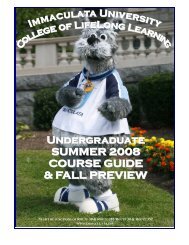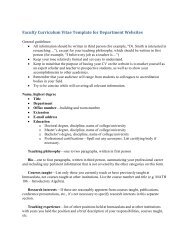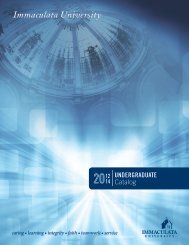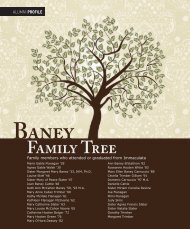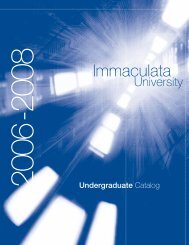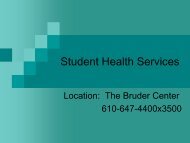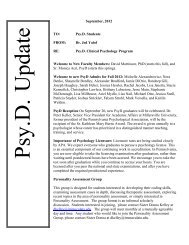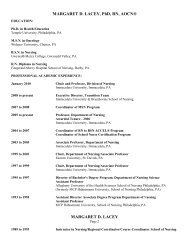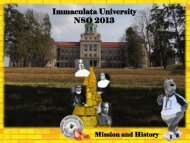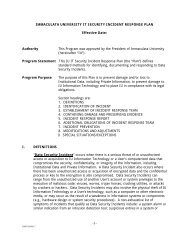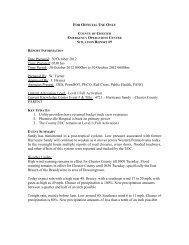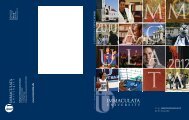Undergraduate Catalog 2008-2010 - Immaculata University
Undergraduate Catalog 2008-2010 - Immaculata University
Undergraduate Catalog 2008-2010 - Immaculata University
Create successful ePaper yourself
Turn your PDF publications into a flip-book with our unique Google optimized e-Paper software.
Academic Policies and<br />
Procedures<br />
ACADEMIC INTEGRITY POLICY<br />
The pursuit of truth and the exercise of honest, intelligent<br />
inquiry are values which guide academic freedom. Without them<br />
knowledge is corrupted and academic freedom undermined. The<br />
following basic principles are inherent in academic honesty:<br />
• Each student’s work must be wholly his or her own.<br />
• Each student will give appropriate acknowledgement of<br />
other’s work when incorporating that work into his or her own.<br />
• Students may not supply or receive unauthorized information<br />
about the form or content of an examination prior to its first<br />
being given.<br />
• Students may not bring into a testing environment any written<br />
material containing that information.<br />
• Students may not use electronic devices (calculator, cell<br />
phone, etc.) during testing unless specifically required for the<br />
examination.<br />
• Students may not submit the same, or essentially the same,<br />
paper or report for credit on two different occasions without<br />
the approval of all instructors involved.<br />
• Students may not take for his or her personal use, study or<br />
research, materials or equipment intended for common use in<br />
assigned work.<br />
• Students shall not log into another student’s, faculty’s or staff<br />
member’s computer account or take information from another<br />
account.<br />
• Students may not plagiarize.<br />
PLAGIARISM<br />
Using, without proper citation or acknowledgement, the words,<br />
ideas, or original research of others is plagiarism. When one relies<br />
on someone else for phraseology, even for only two or three words,<br />
one must acknowledge indebtedness by using quotation marks and<br />
giving the source, either in the text or in a footnote. When one<br />
borrows facts which are not matters of general knowledge—<br />
including all statistics and translations—one must indicate one’s<br />
indebtedness in the text or footnote. When one borrows an idea or<br />
the logic of an argument, one must acknowledge indebtedness either<br />
in a footnote or in the text.<br />
The <strong>University</strong> considers plagiarism by a student a serious<br />
violation of professional ethics and standards. Plagiarism is defined<br />
as the presentation as new and original an idea or product derived<br />
from an existing source. Cheating is defined as the deliberate<br />
violation of the rules of academic honesty. Such violations may<br />
result in the imposition of a serious academic penalty such as but not<br />
limited to, suspension, transcripted F, non-continuation, or exclusion.<br />
Whenever an alleged infraction of academic integrity occurs, the<br />
student and the teacher are to discuss the matter and attempt to<br />
resolve the difficulty while maintaining the standards of <strong>Immaculata</strong><br />
<strong>University</strong>. If student and faculty member are not able to reach a<br />
satisfactory solution, the matter is brought to the chair of the<br />
department. If the problem needs further discussion, it should be<br />
brought to the attention of the dean of the appropriate college. If<br />
the student does not accept the decision of the dean of the college,<br />
the student may request to implement the <strong>University</strong> Grievance<br />
Policy as outlined in the Student Handbook.<br />
ACADEMIC STANDING AND PROGRESS<br />
The baccalaureate degree program at <strong>Immaculata</strong> <strong>University</strong><br />
requires a minimum of 126-128 credit hours. Normal progress<br />
toward achieving a degree in four years for a student in the College<br />
of <strong>Undergraduate</strong> Studies requires eight semesters of 12 to 18<br />
credits, depending on the curriculum sequence of each major.<br />
<strong>Immaculata</strong> has a fixed comprehensive tuition rate for full-time<br />
College of <strong>Undergraduate</strong> Studies students. The tuition rate will<br />
remain fixed for the four year program (eight fall and spring<br />
semesters). Full-time students taking more than 18 credits per<br />
semester will be charged the current per credit rate for each<br />
additional credit. Music lessons will be billed separately.<br />
To be classified as full-time, a student in the College of<br />
<strong>Undergraduate</strong> Studies must carry a minimum of 12 credit hours<br />
each semester. A student carrying 11 or fewer credit hours is<br />
considered part-time. Part-time status impacts billing, financial aid<br />
and eligibility for residence.<br />
As listed below, a student’s academic status is determined by the<br />
number of credit hours earned:<br />
Credit Hours<br />
Completed Class<br />
0-23 Freshman<br />
24-53 Sophomore<br />
54-89 Junior<br />
90 or more Senior<br />
A student’s academic progress is evaluated at the end of each<br />
semester. Since a cumulative grade point average of 2.00 is the<br />
minimum requirement for graduation, a student whose GPA falls<br />
below 2.00 at the end of any semester will be cautioned that this<br />
level of performance is insufficient to satisfy the requirement for<br />
graduation. A student with a GPA below the minimum levels<br />
indicated in the table below will be placed on academic probation.<br />
Semesters Completed Minimum GPA<br />
1 1.60<br />
2 1.70<br />
3 1.85<br />
4 or more 2.00<br />
Ordinarily, a student may not be on academic probation for more<br />
than two consecutive semesters. A student may receive federal,<br />
state, and/or university financial aid during the probation period. A<br />
student on academic probation must show improvement during the<br />
following semester to remain at the university. In some cases, a<br />
student may be dismissed without any previous probation if the<br />
student’s academic standing is so poor that probation would not be<br />
in the student’s best interest.<br />
In addition, Financial Aid requires that the student maintain<br />
satisfactory academic progress, which means that a full-time student<br />
must earn at least 67% of credits attempted. Part-time students<br />
must be enrolled in at least six credits per semester to remain<br />
eligible for aid. For further explanation, see Financial Aid.<br />
ACADEMIC DISMISSAL AND READMISSION<br />
A student who has been academically dismissed from the<br />
<strong>University</strong> must meet standards for re-admission set by the dean of<br />
the appropriate college. Transcripts documenting acceptable work<br />
must be presented in the office of the appropriate dean prior to<br />
application for re-admission. If all standards for re-admission have<br />
been met, then the student must follow the normal admission<br />
process for the appropriate college as a transfer student.<br />
CHANGE OF STATUS<br />
Students in the College of <strong>Undergraduate</strong> Studies who wish to<br />
transfer to the College of LifeLong Learning, must follow procedures<br />
for withdrawal from the College of <strong>Undergraduate</strong> Studies and then<br />
apply to the College of LifeLong Learning. Similarly, students who<br />
wish to transfer from the College of LifeLong Learning to the College<br />
of <strong>Undergraduate</strong> Studies must withdraw from the College of LifeLong<br />
Learning and apply to the College of <strong>Undergraduate</strong> Studies.<br />
28



